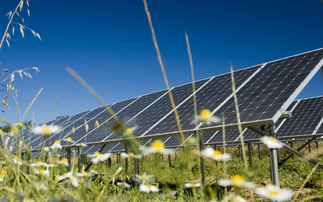Big Yellow Self storage has slashed energy bills and boosted its reputation with investors through a series of green measures, says Peter Sermon
Using resources wisely sounds like a no brainer. What profit-making company would want to operate wastefully, using expensive energy unnecessarily while stacking up energy bills and watching profit margins dwindle?
Some of the benefits of resource efficiency are obvious: if you use resources wisely or simply use less, you will save money and help preserve the environment. But many forget about the reputational gains you can get from demonstrating a genuine commitment to minimising environmental impact. After all, who wouldn't want to invest in, or buy from, an efficient organisation?
Gerrit Heyns, partner at Osmosis Investment Management, maintains that resource efficient companies, which use less energy, water and create less waste per unit of revenue, "tend to produce higher investment returns than their less resource efficient rivals".
As well as appealing to investors, companies seen to be acting responsibly may attract more revenue, as consumers grow more environmentally conscious and make choices based on more than price alone. This in itself acts as a further draw for investors because a company with a healthy sales pipeline is an attractive investment opportunity. So it's really a virtuous circle.
Heyns continues, "Sustainability is an economic imperative. Companies that use less to create more show greater sustainability; as a business, for the environment and for the world as a whole."
Big green ambitions
In 2007, the self storage company Big Yellow Group started taking a closer look at how it should respond to emerging European climate change legislation. It acted quickly (earning itself first mover advantages), identifying grid supplied electricity and the resulting carbon emitted as the most significant impacts of the business' operations, and then worked to limit them.
Paul Donnelly, corporate social responsibility manager at Big Yellow Group said the move boosted its appeal to investors.
"To improve our resource efficiency and cut energy spend, we became an early adopter of sustainable and renewable initiatives," he said. "As well as saving us thousands off our energy bills, we see a growing interest from investors in our ability to integrate our financial, social and environmental objectives so that we are a truly sustainable business. It means we're profitable but not at the expense of the environment."
As a result of its focus on corporate social responsibility and renewable energy initiatives, Big Yellow's status has risen on investor disclosure league tables and benchmarks. Scoring well on green consumer league tables not only generates sales but also helps differentiate it from less ‘green' minded competitors.
Going solar
Big Yellow also started trialing low carbon emission technologies. Solar PV proved to be the most viable renewable because it is ideal for the company's extensive unused roof spaces in urban environments. Working with Solarcentury for the last six years, it has installed 15 solar PV roof systems, providing 20 per cent of the electricity used in four stores with 50kWp capacity installations. Solar is now installed at every new store and one retrofit is completed each year.
Self-generated solar electricity means the company is less at the whim of fluctuating electricity prices and its solar panels have displaced grid electricity and carbon taxation costs. It has also improved the company's energy security.
Donnelly explains that the feed in tarriff payments have also offset some of the upfront costs. "Our solar programme has helped us cut carbon as well as our energy bills - so we have actually been making money from our roofs.
"We earn solar PV "cash back' payments from the government's feed-in-tariff scheme for up to 20 years and this stability gained through our long term investment in renewables is attractive to our investors."
But its green ambitions don't just stop at solar - the company has also installed energy efficiency technologies including motion sensor lighting and LED lighting. When combined with solar, this will help Big Yellow to cut overall electricity use by 30 per cent by the end of 2014, reducing operational costs and pleasing investors.
Renewables win investor approval
It's not just Big Yellow turning to renewables to meet its energy needs. A recent report by Smartest Energy found on-site generation by UK businesses increased by 53 per cent in 2012 alone, with almost 90 per cent of that coming from solar and wind. The motivation now is mainly energy security, which understandable given the recent price hikes by the "Big Six" energy companies for fossil fuels.
As more companies look for alternative ways to source their energy and diversify from fossil fuels, whatever their motivations for doing so, it's likely that they'll win further investor approval for their efforts.
Peter Sermon is vice president of sales at Solarcentury, which is a partner of the BusinessGreen Solar Hub








